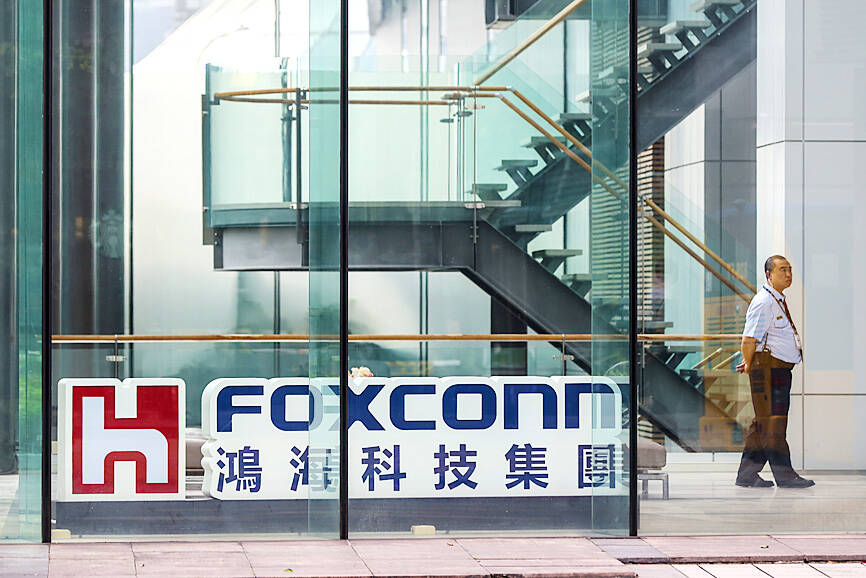The construction of Hon Hai Precision Industry Co’s (鴻海精密) massive artificial intelligence (AI) server plant near Guadalajara, Mexico, would be completed in a year despite the threat of new tariffs from US President Donald Trump, Jalisco Governor Pablo Lemus said.
Hon Hai, also known as Foxconn Technology Group (富士康科技集團), is investing about US$900 million in what would become the world’s largest assembly plant for servers based on Nvidia Corp’s state-of-the-art GB200 AI chips, Lemus said.
The project consists of two phases: the expansion of an existing Hon Hai facility in the municipality of El Salto, and the construction of a new plant nearby. Construction “should be finished in a year,” Lemus said, adding that the plant is expected to open late this year or early next year.

Photo: Ritchie B. Tongo, EPA-EFE
The company is in the process of obtaining permits from the municipal government of El Salto to start the construction of the new plant, said Cindy Blanco, Jalisco’s secretary of economic development.
The state government would provide fiscal incentives to support the project, and her office would be “as supportive as possible with all the paperwork, whatever they may need, in the process of opening their plant here in the state,” she said.
Hon Hai began growing its server-related business in Mexico during the first Trump administration as a hedge against US-China tensions.
While Trump’s 25 percent tariffs on Mexico could risk increasing the cost of doing business in the country for the Taiwanese firm and others, new investment in the state was on the rise and likely to increase this year compared with last year, Lemus said.
“What various plants have told us is that regardless of what happens with the tariffs announced by President Trump, they will continue working in Mexico,” he said. “Not only have we not seen investments slow down, on the contrary, they continue to arrive in Jalisco.”
As much as US$300 million is being invested this year in industrial parks across Jalisco, with demand surging. Up to 60 percent of the more than 600,000m2 of available industrial space is already leased, Lemus said.
Jalisco is home to about 70 percent of companies in Mexico’s semiconductor industry. In addition to the Foxconn plant, ASE Technology Holding Co’s (日月光投控) ISE Labs Inc announced in November last year that it had acquired land in the municipality of Tonala for a new semiconductor packaging and testing facility. Also last year, Micron Technology Inc said that it would establish a new engineering and operations center in Guadalajara. Meanwhile, Mexican President Claudia Sheinbaum’s “Kutsari” initiative — aimed at growing the country’s semiconductor industry — includes plans for a new design center in Jalisco.
Jalisco would “welcome all investments,” including from China, Lemus said.
“We cannot limit the arrival of investments from any country,” he said.

NEW IDENTITY: Known for its software, India has expanded into hardware, with its semiconductor industry growing from US$38bn in 2023 to US$45bn to US$50bn India on Saturday inaugurated its first semiconductor assembly and test facility, a milestone in the government’s push to reduce dependence on foreign chipmakers and stake a claim in a sector dominated by China. Indian Prime Minister Narendra Modi opened US firm Micron Technology Inc’s semiconductor assembly, test and packaging unit in his home state of Gujarat, hailing the “dawn of a new era” for India’s technology ambitions. “When young Indians look back in the future, they will see this decade as the turning point in our tech future,” Modi told the event, which was broadcast on his YouTube channel. The plant would convert

‘SEISMIC SHIFT’: The researcher forecast there would be about 1.1 billion mobile shipments this year, down from 1.26 billion the prior year and erasing years of gains The global smartphone market is expected to contract 12.9 percent this year due to the unprecedented memorychip shortage, marking “a crisis like no other,” researcher International Data Corp (IDC) said. The new forecast, a dramatic revision down from earlier estimates, gives the latest accounting of the ongoing memory crunch that is affecting every corner of the electronics industry. The demand for advanced memory to power artificial intelligence (AI) tasks has drained global supply until well into next year and jeopardizes the business model of many smartphone makers. IDC forecast about 1.1 billion mobile shipments this year, down from 1.26 billion the prior

People stand in a Pokemon store in Tokyo on Thursday. One of the world highest-grossing franchises is celebrated its 30th anniversary yesterday.

Zimbabwe’s ban on raw lithium exports is forcing Chinese miners to rethink their strategy, speeding up plans to process the metal locally instead of shipping it to China’s vast rechargeable battery industry. The country is Africa’s largest lithium producer and has one of the world’s largest reserves, according to the US Geological Survey (USGS). Zimbabwe already banned the export of lithium ore in 2022 and last year announced it would halt exports of lithium concentrates from January next year. However, on Wednesday it imposed the ban with immediate effect, leaving unclear what the lithium mining sector would do in the